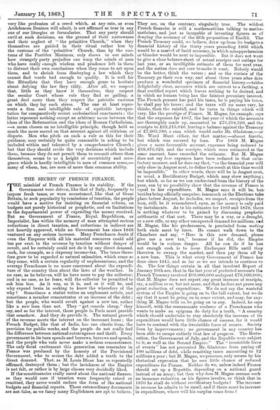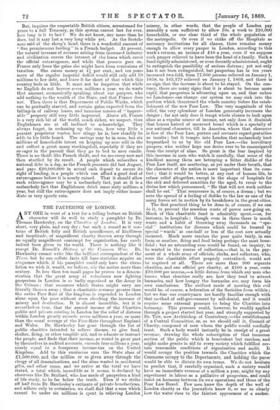THE SECRET OF FRENCH FINANCE. THE SECRET OF FRENCH FINANCE.
THE mischief of French Finance is its stability. If the Government were driven, like that of Italy, frequently to impose fresh taxes, or were accustomed, like that of Great Britain, to seek popularity by remissions of taxation, the people would have a motive for insisting on financial reform, on budgets not purely historical or prophetic, and on limitations to the departmental power of expending the money received. But no Government of France, Royal, Republican, or Imperialist, has within the memory of man attempted serious reductions in direct taxation, and reductions in indirect are not heartily approved, while no Government has since 1848 ventured on any serious increase. Many Frenchmen doubt if even the Emperor with all his material resources could add ten per cent, to the revenue by taxation without danger of revolt, and he certainly could not do it by any direct demand, such, for example, as a sixpenny income-tax. The taxes therefore grow to be regarded as natural calamities, which come as they come, with a certain regularity of unpleasantness, and the average Frenchman is no more concerned about the expenditure of the country than about the laws of the weather. In no case, as he believes, will he have more to pay the collector; and in no case, as he fears, will the collector be permitted to ask him less. As it was, so it is, and so it will be, and why expend brain in seeking to know the wherefore of the why ? Sometimes a statist writes an unpleasant article, and sometimes a member remonstrates at an increase of the debt ; but the people, who would revolt against a new tax, rather like a new loan than not. They "get consols cheap," they say, and as for the interest, those people in Paris must provide that somehow. And they do provide it. The natural growth of the revenue meets the interest on the incessant loans ; the French Budget, like that of India, has one elastic item, the provision for public works, and the people do not really feel the difference between national extravagance and thrift. Every government in its turn spends and borrows, borrows and spends, and the people who vote never make a serious remonstrance. The only fiscal excitement this generation can remember in
France was produced by the honesty of the Provisional Government, who to secure the debt added a tenth to the direct demand. That, as M. Louis Blanc has so repeatedly affirmed, destroyed them ; but the lavishness of the Empire is not felt, or rather is by large classes very decidedly liked. If the-constituencies really cared about the national finance, as they would care if taxation were frequently raised or remitted, they never would endure the form of the national budgets and financial reports. Those extraordinary documents are not false, as we fancy many Englishmen are apt to believe. They are, on the contrary, singularly true. The wildest French financier is still a mathematician talking to mathematicians, and just as incapable of inventing figures as of denying the accuracy of the fifth proposition of Euclid. The French Treasury could, we believe, draw up from its budgets a financial history of the thirty years preceding 1866 which would be a marvel of lucid accuracy, in which misapprehension or blunder would be next to impossible. But it does not want to give a clear balance-sheet of actual receipts and outlays for last year, or an intelligible estimate of them for next year, and the nation does not care to make it want. Nobody would be the better, think the voters ; and so the statists of the Treasury go their own way, and about three years after date produce a wonderful specimen of financial history,—tables delightfully clear, accounts which are correct to a farthing, a final rectified report which leaves nothing to be desired, and in which no human being has the faintest pecuniary interest. The French peasant. has paid his taxes, he is paying his taxes, he shall pay his taxes ; and the taxes will no more vary, he thinks, than the rainfall, and he turns to things which will vary, like the prestige of France. M. Magne, for example, says that the expenses for 1867, the last year of which the accounts are thoroughly made up, amounted to £76,218,320, and the receipts to £69,215,040, leaving a balance against the Treasury of £7,003,280, a sum which would make Mr. Gladstone,—or Mr. Ward Hunt either, for that matter,—almost frantic, but which was covered by loan. For 1868 M. Magne gives a more favourable account, expenses being reduced to £68,876,628, and the receipts, which were estimated at the same amount, have exceeded the estimate. But M. Magna does not say how expenses have been reduced in that satisfactory manner, and he does say that, "as the financial year will only close in August next, to define the result at this time would be impossible." In other words, there will be in August next, as usual, a Rectificatory Budget, which may show anything.; but which, so far as we can understand from the history of the year, can by no possibility show that the revenue of France is equal to her expenditure. M. Magne says it -will be, but. besides being officiallysanguine, inasmuch as the Elections take place before August, he includes, we suspect, receipts from the loan, still, be it remembered, open, as the money is only paid by instalments. As to his estimates for 1869 and 1870, there is nothing whatever to be gained by discussing prophetic arithmetic of that sort. There may be a war, or a drought, or a new rifle, or any other unexpected demand for millions, aid M. Magne, like his predecessors, is precluded from making both ends meet by force. He cannot walk down to the Chambers and say, "Here is this new demand, please give me a new tax," because if lie did, the Empire would be in serious danger. All he can do if he has not enough cash is to issue Exchequer Bills until they threaten to swamp the market, and then pay them off by a new loan. This is what every Government of France has done since 1815, and as far as we see intends to continue to do. The few things certain in all that involved Report of January 10th are, that in the last year of perfected accounts the French Treasury received £69,000,000 andspent £76,000,000; that M. Magne does not expect any great increase of receipts, say, a million or so, but not more, and that he does not prove any great reduction of expenditure. We do not say the wasteful system of the Empire is going on to the full extent, but we do say that it must be going on to some extent, and may, for anything M. Magne tells us, be going on to any. Indeed, he says himself, with the consummate coolness of a Frenchman who wants to make an epigram do duty for a truth, "A country which should undertake to stay absolutely the increase of its expenditure would have little chance of success, for it would have to contend with the irresistible force of events. Society lives by improvements ; no government in any country has been able to escape entirely that law of progress. The Restoration, the Government of July, and the Republic were subject to it, as well as the Second Empire." The "irresistible force of events" has not prevented Mr. Gladstone from paying off 100 millions of debt, while remitting taxes amounting to 12 millions a year ; but M. Magne, we presume, only means by his rhetorical expression that he sees little chance of reduced expenditure for France. Neither do we, unless indeed France should set up a Republic, depending on a national guard instead of an army; but then why does M. Magne assume such an immense reduction as his figures involve, or think that in 1870 he shall do without rectificatory budgets ? The increase in revenue he admits to be small, and if there must be increase in expenditure, where will his surplus come from ? But, inquires the respectable British citizen, accustomed for years to a full Treasury, as this system cannot last for ever, how long is it to last ? We do not know, any more than he does, but it may last a very long while yet. As the Scotchman said of the sheep's head, there is a wonderful amount of "fine promiscuous feeding" in a French budget. At present, the natural increase of revenue arising from increased industry and civilization covers the interest of the loans which cover the official extravagance, and while that process goes on, France only loses the gains she might have from remissions of taxation. She raises money at 41 per cent., and ten years more of the regular imperial deficit would still only add 70 millions to her debt, and leave it far short of that which this country feels so little. It must not be forgotten that while we English do not borrow seven millions a year, we do waste that amount, economically speaking, about our paupers, who add nothing to the wealth of the State, and that France does not. Then there is that Department of Public Works, which can be gradually starved, and certain gains expected from the falling-in of railway leases, and immense masses of " improvable " property still very little improved. Above all, France is a very rich bit of the world, much richer, we suspect, than Englishmen are at all inclined to acknowledge. They always forget, in reckoning up the sum, how very little a peasant proprietor wastes, how stingy he is, how steadily he adds to his little hoard. The savings may be in sous, but six millions of households intent on heaping up sous will in the end collect a great many stockingsfull, especially if they are so eager in the pursuit that they go to bed to save candle. There is no thrift like French thrift, and we are every now and then startled by its result. A people which subscribes a national debt in a day, as the French peasants did last August, and pays £20,000,000 in actual cash deposit to secure its right of lending, is a people which can afford a good deal of extravagance before it is nearly ruined. That it should allow such extravagance may be a melancholy fact, just as it is a melancholy fact that Englishmen drink some sixty millions a year, but still the extravagance does not imply either immediate or very speedy ruin.































 Previous page
Previous page